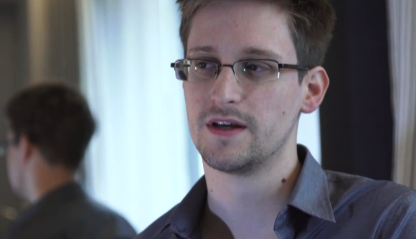
Former NSA leaker Edward Snowden emerged from hiding today at Moscow's Sheremetyevo International Airport, where he held a press conference to give a statement requesting temporary asylum from Russia and announcing his formal acceptance of "all offers of support or asylum I have been extended and all others that may be offered in the future." Snowden also expressed gratitude to the five nations who have shown support for his cause and denounced the United States' efforts to keep him from flying to Latin America - where he has been offered asylum by Venezuela, Nicaragua and Bolivia - warning that they represent "a threat to all of us, and must not be allowed to succeed."
His speech comes as the United States government has kicked off what the New York Times described on Thursday as a "diplomatic full-court press" on the three Latin American countries which have granted Snowden asylum. The Times reports that Vice President Joseph Biden called Ecuadorian President Rafael Correa in an attempt to convince him not to grant asylum. Correa praised the "cordial" tone Biden took during the call, but later took a defiant stance on the issue, saying he would not let his country be swayed by the threat of removing preferential trade benefits currently existing between the United States and Ecuador and that any decision they made would be carried out with "absolute sovereignty". But he has also dragged his feet on offering asylum outright, saying Snowden would have to be on Ecuadorian territory to be eligible.
RELATED: Flight To Havana Takes Unusual Route, Suspected Of Carrying Snowden
State Department officials have also warned Venezuela that if it goes through with its plan to offer what President Nicolás Maduro called "humanitarian asylum", both sides' hopes for better ties would be essentially defeated. A senior State Department official told the Times that any Latin American government seen to be aiding Snowden "would put relations in a very bad place for a long time to come", adding, "If someone thinks things would go away, it won't be the case."
RELATED: Julian Assange Says Latin American Sovereignty At Stake Over Snowden Affair
Elias Jaua, Venezuela's foreign minister, had earlier dismissed similar threats. "The State Department and the government of the United States should know that Venezuela learned a long time ago and defeated pressures from any part of the world," he said in a television interview this week.
RELATED: Maduro Says Formal Snowden Request Received
Snowden also denounced the US government in his speech for pressuring European countries to revoke Bolivian President Evo Morales' permission to their airspace when it was suspected he was ferrying Snowden home from Russia.
"[The US] has even taken the unprecedented step of ordering military allies to ground a Latin American president's plane in search for a political refugee," he said. "These dangerous escalations represent a threat not just to the dignity of Latin America, but to the basic rights shared by every person, every nation, to live free from persecution, and to seek and enjoy asylum."
At a press conference on Friday, Jay Carney, the White House's spokesperson, also gestured at the agitation Russia was causing by hosting Snowden's press conference while attempting to strike a conciliatory note.
"I would simply say that providing a propaganda platform for Mr. Snowden runs counter to the Russian government's previous declarations of Russia's neutrality," Carney said. He added that it was "incompatible with Russia's assurances that they do not want Mr. Snowden to further damage US interests. But having said that, our position also remains that we don't believe this should -- and we don't want it to -- do harm to our important relationship with Russia".
© 2025 Latin Times. All rights reserved. Do not reproduce without permission.




